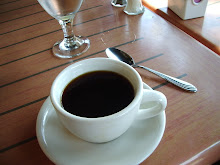This weekend I finished a book by Nicole Krauss called The History of Love. It is the most wonderful thing I have read in a very long time, and I was reminded of that bittersweet moment of ending a beautiful story, unwilling to let the characters go but glad to see them through to the end - a moment that I do not believe I have felt since I read The Neverending Story (over and over) as a kid. Although I guess The Buddha of Suburbia by Hanif Kureishi was bittersweet to finish as well, but mostly just bitter - I dragged out the last pages for a week.
In any case, The History of Love is an indescribably beautiful book that I shall, at this moment, feebly attempt to describe. I could not put the damn thing down. I spent all weekend reading it in my window-seat, ignoring much more urgent homework (yes, the glory of being assigned a novel for homework is a double-edged sword). It tells the story of an old man, Leopold Gursky, who survived the German invasion of Poland with the sole motivation of a girl, Alma, who had left their hometown in Poland for a school in America shortly before the Nazis arrived. It also tells the story of a young girl, Alma, whose father has died and whose mother refuses to fall in love with anyone else. It also tells a story of a book, The History of Love, which Alma's father gave to Alma's mother in the first days of their courtship, and for which Alma is named - you see, each girl in The History of Love is named Alma, who the author describes as "the first girl." Alma's mother is asked by a mysterious benefactor to translate the book from Spanish to English as Alma tries to find the real history behind The History of Love. Meanwhile, Leopold lives his life alone, alternately awaiting death and celebrating life. The stories are tied together in beautiful linguistic subtleties, words and sentences appearing in one section and then another, a theme from The History of Love repeated by one character or another in conversation or narration. Also, the passages from The History of Love that are revealed in the novel taste of a magical realism, reminiscent of but more tender than Gabriel Garcia Marquez's One Hundred Years of Solitude.
It occurs to me that I have said almost nothing here about the enchanting, magnetic nature of the story, and why it made me sob outright in my window-seat and turn the final pages with an anticipation that might have been appropriate only if I was actually a character in the book and ache inside as if the book had put love there, or at least reminded me of the love that was already there. And the truth is, I have no idea. It's books like this one that both remind me of why I wanted to write in the first place, and fill me with despair that I will never, ever write anything as good. But it's just gorgeous - the language; the humanity and mystery of the characters; the carefully interwoven web of story, themes, and language; and the astonishingly accurate account of what love feels like, looks like, sounds like, and is. I was consumed by a ferocious desire to read the book, The History of Love, that is mentioned in the novel, as well as a childlike sadness knowing that it isn't a real book. However, the actual book The History of Love was plenty satisfying. I only wish that there were more of them... although, upon reflection, wouldn't they all be the same?
Interestingly enough, I discovered that Nicole Krauss is married to Jonathan Safran Foer, most famously the author of the novels Everything is Illuminated and Extremely Loud and Incredibly Close. I have only read a couple of his short stories, my favorite being "Here We Aren't, So Quickly," but from that beautiful piece of work I would have to say it's a lovely match that makes me deeply envious in a way that I don't entirely understand. She dedicates The History of Love "For my grandparents, who taught me the opposite of disappearing, and for Jonathan, my life." Ah, to be writers in love - especially writers of such lovely things.
So, everyone who is reading this now ought to go out and read The History of Love and be ready to put aside a whole weekend and, most likely, if you are as sentimental as I am, a box of tissues.
You're welcome.
Subscribe to:
Post Comments (Atom)

No comments:
Post a Comment